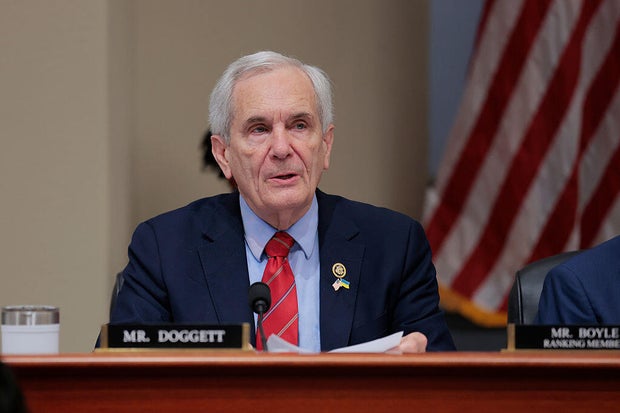As the political climate in Texas undergoes a significant transformation with the latest GOP-led redistricting efforts, a longstanding Democratic figure in the House of Representatives from Texas, Rep. Lloyd Doggett, announced that he will not seek re-election if the current redistricting plan, backed by former President Donald Trump, is implemented. This decision could potentially reshape the Democratic stronghold in Texas and has major implications for the political landscape within the state.
Rep. Doggett, who is 78 years old and has been a familiar face in Congress since 1995, finds himself at the center of significant attention following his announcement. His decision hints at the complexities introduced by the impending redistricting measures and how these changes might influence veteran politicians’ career trajectories. Doggett has been a prominent figure, representing Texas’ 37th congressional district, an area known for its Democratic leanings and vibrant community engagement.
The proposed redistricting plan by Republican lawmakers in Texas seeks to redraw several congressional lines, which would inevitably alter the political boundaries significantly. As part of this shift, the 35th congressional district, predominantly represented by 36-year-old Rep. Greg Casar, a younger and progressive voice within the Democratic Party and chair of the Congressional Progressive Caucus, would see substantial changes. The alterations would potentially reshape it in a way that makes it more favorable to Republican candidates.
This proposed shift has brought forth the potential for a heated primary scenario within the Democratic Party, where Doggett and Casar might have had to face off for the 37th district’s nomination. Such an internal contest could have split voter bases and resources, possibly weakening the party’s stance in subsequent general elections.
Doggett’s announcement, therefore, serves multiple purposes. On one hand, it possibly frees Casar to continue his advocacy and legislative work in his current district without the burden of a resource-draining primary battle against a fellow Democrat. On the other hand, Doggett seems to be positioning himself as a bulwark against policies and initiatives pushed by Republicans that he believes could undermine democratic processes and district representation fairness.
In a statement released last Thursday, Doggett expressed his disappointment over the legal prospects of the GOP’s redistricting plans. He lamented, “If the courts give Trump a victory in his scheme to maintain control of a compliant House, I will not seek re-election in the reconfigured CD37, even though it contains over two-thirds of my current constituents.” This indicates his deep concerns about the manipulations of district lines being perceived as efforts to dilute the democratic will and his constituents’ influence.
Earlier, Doggett had made a public plea to Casar, encouraging him to reconsider running in the redrawn 35th district, highlighting the strategic importance of maintaining Democratic seats over individual ambitions. Doggett emphasized this in a tweet, affirming that his fight was squarely against what he perceives as Trump’s tyranny, not against his fellow Democrats.
The redistricting controversy in Texas is not just a standalone event but is part of a broader national narrative where both Democrats and Republicans are vying for control over the House by influencing the redistricting process in various states. This strategic manipulation, known as gerrymandering, has been a critical tool for both parties to gain electoral advantages in many states across the country.
This particular redistricting effort in Texas has been contentious and fraught with political drama, including instances where Democratic legislators fled the state during a special legislative session to prevent a quorum hence delaying the redistricting vote. Despite these efforts, the redistricting bill eventually passed through the Texas House and appeared set to sail through the Senate with expectations of being signed into law by the Republican Governor of Texas.
With legal challenges to the new maps anticipated, the final shape and influence of these districts remain uncertain. What is clear, however, is the shifting dynamics that veteran politicians like Doggett must navigate as they decide their political futures. Doggett’s stepping down could mark the end of an era and the beginning of a new chapter in Texas politics, shaped by emerging leaders like Casar who represent the younger, progressive wing of their party.
Lloyd Doggett’s legacy as an in-depth legislator and advocate for democracy will undoubtedly influence ongoing discussions about democratic processes and fair representation in America. His move also leaves open crucial questions about effective strategies for Democrats in not only Texas but nationally as both parties recalibrate in response to newly drawn political landscapes. With potential shifts in voter alignments and district boundaries, the need for strategic, future-focused leadership becomes ever more apparent.









